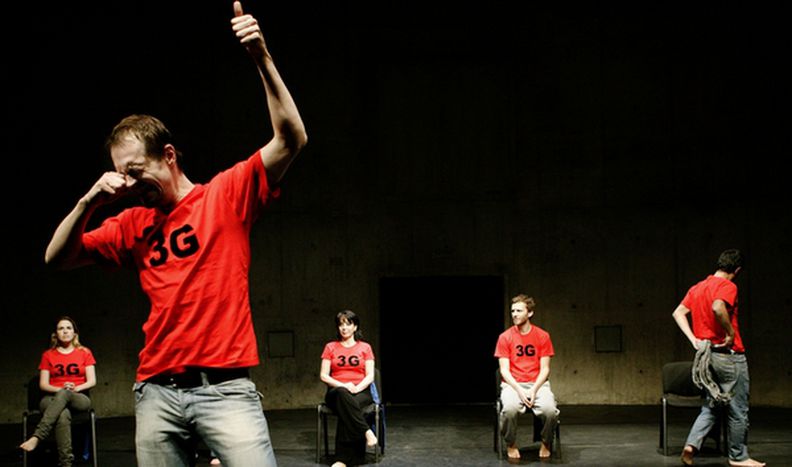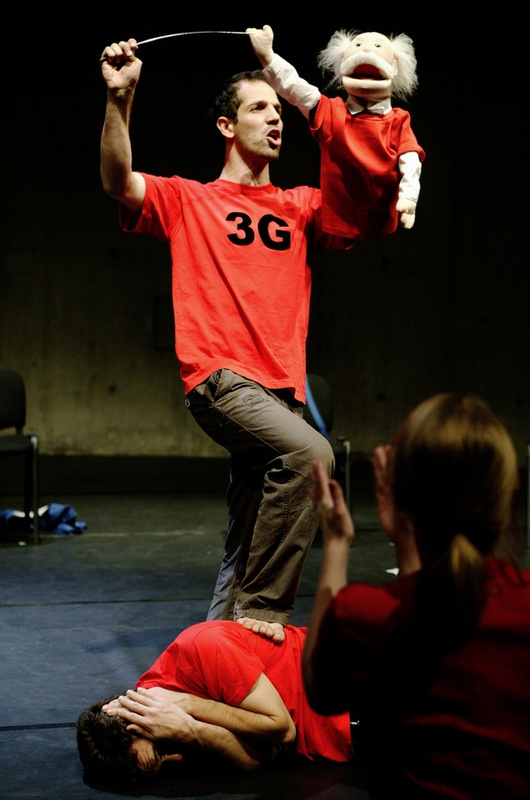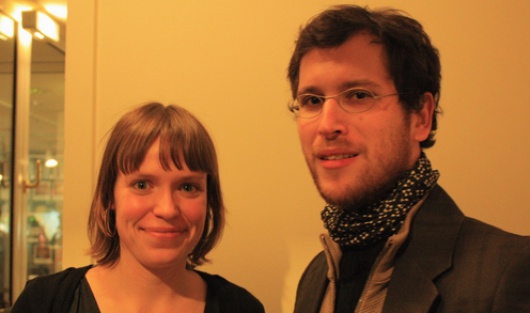
Israeli-German theatre: the Holocaust, Nazi and Palestinian 'Third Generation'
Published on
Translation by:
Annie RutherfordTogether with the dramaturges Amit Epstein and Irina Szodruck, Israeli director Yael Ronen ventured on an experiment with Third Generation. The theatre project has already been performed as a work in progress in Halle (Germany), Tel Aviv and Parma (Italy). A newly finished version hit the Berliner Schaubühne in early May. Review and interview
A half circle of chairs in the plain hall of the Berliner Schaubühne. Ten young actors around the age of thirty sit on the chairs, barefoot in grey tracksuit trousers and brightly coloured T-shirts which say 3G. They don't belong to a therapy group: they are the Third Generation. None of these grandchildren of Holocaust survivors, displaced Palestinians and national socialists is directly responsible for what their grandparents did. Yet the experiences of the first generation in this particular national context influence their own self-perceptions more than you would expect.
 In 2008, Yael Ronen began a work-in-progress which exaggerates the experiences and prejudices of everyone involved and works them into short scenes for the theatre. During the process, the German, Israeli and Palestinian actors became aware of complexes and feelings of guilt which they experience as representatives of the third generation. In scenes bordering on stand-up comedy, German Niels is abused as a 'Nazi mouse murderer' by his Israeli friend because he has installed an electronic mousetrap; Jewish teenagers are parodied on a 'Holocaust and Shopping' school trip to the concentration camps in Poland ('Auschwitz was the best'); and Palestinian actor George celebrates his success in Israeli films in which he can play the parts of the fundamentalist terrorist 'with a big heart'.
In 2008, Yael Ronen began a work-in-progress which exaggerates the experiences and prejudices of everyone involved and works them into short scenes for the theatre. During the process, the German, Israeli and Palestinian actors became aware of complexes and feelings of guilt which they experience as representatives of the third generation. In scenes bordering on stand-up comedy, German Niels is abused as a 'Nazi mouse murderer' by his Israeli friend because he has installed an electronic mousetrap; Jewish teenagers are parodied on a 'Holocaust and Shopping' school trip to the concentration camps in Poland ('Auschwitz was the best'); and Palestinian actor George celebrates his success in Israeli films in which he can play the parts of the fundamentalist terrorist 'with a big heart'.
The play is most impressive when it moves from the scenes based on personal experiences into acted scenes, which by way of exception do without irony. The fraught relationship between a mother in the Gaza Strip and her son who soils his pants out of the fear of an Israeli attack. The young Israeli soldier who sees his dead German grandmother in the face of a Palestinian, which indocrinates in him the fact that everyone just wants to see his blood - so he shoots. Despite the simplification of very complex contents it becomes clear during the course of the play that every position and every trauma is legitimate. No perspective is just right or just wrong. When it is asked, 'Who is the perpetrator' and everyone points to the others, when it is asked 'who is the victim' and everyone points to themselves, it becomes clear how arbitrary the categories 'victim' and 'perpetrator' are.
Amit Epstein is a member of the third generation. The all-round artist was born in Tel Aviv in 1977 and has lived in Berlin since 2003. He worked on Third Generation as a dramaturge. Interview
How was Third Generation created?
 The first phase of the project served as research; the actors went to Israel, Berlin and into Palestinian territories and talked to therapists, journalists, politicians and writers who have a particular opinion on the German-Jewish relationship or the Israeli-Palestinian conflict. In the second phase we considered together how the personal experiences could be presented dramatically. Here the idea emerged of a half-circle, similar to that of a group therapy session, from which everyone can present their scene. The content of the individual scenes continued to change throughout the process, particularly after the renewed conflict in Gaza.
The first phase of the project served as research; the actors went to Israel, Berlin and into Palestinian territories and talked to therapists, journalists, politicians and writers who have a particular opinion on the German-Jewish relationship or the Israeli-Palestinian conflict. In the second phase we considered together how the personal experiences could be presented dramatically. Here the idea emerged of a half-circle, similar to that of a group therapy session, from which everyone can present their scene. The content of the individual scenes continued to change throughout the process, particularly after the renewed conflict in Gaza.
What does it mean to be an Israeli, German or Palestinian in the third generation?
The first and second generations have their own discourse about the Holocaust and the events in the Palestinian territory. They have quite a specific terminology; they think in terms of the categories of 'victim' and 'perpetrator'. The third generation is experiencing a great discrepancy at the moment: on the one hand these events happened a long time ago historically; on the other hand they determine the lives and the identities of the third generation to such an extent that they cannot be ignored.
'The third generation simply needs its own language'
They didn't experience the Holocaust or the expulsion from the Palestinian villages. They are no longer 'victims' or 'perpetrators'; they have other positions, for which they need a new language and a new terminology. Every group has its own type of narrative and it isn't always easy to say whether one is right and the other wrong, as each type of narrative is legitimate. The third generation simply needs its own language.
At the end of the performance there is a loud clash between all of the groups involved. The actors come on for the curtain call wearing head bandages and neck braces and with their arms in plaster. Is there hope for a solution to the conflict?
I don't see the situation as a whole as a problem to which there is a concrete solution. What there can be is a constant discussion, a constant excavation of the past. Some things can't be 'made right' again. The Holocaust can't be 'made right' again. But we can keep a dialogue going and see the human in those we call enemies; we can accept the suffering of others and understand that we don't lose anything through their suffering.
Third Generation runs at the Berliner Schaubühne from 2-7 May
Translated from „Auschwitz was the best“ - Die eigene Sprache der dritten Generation



